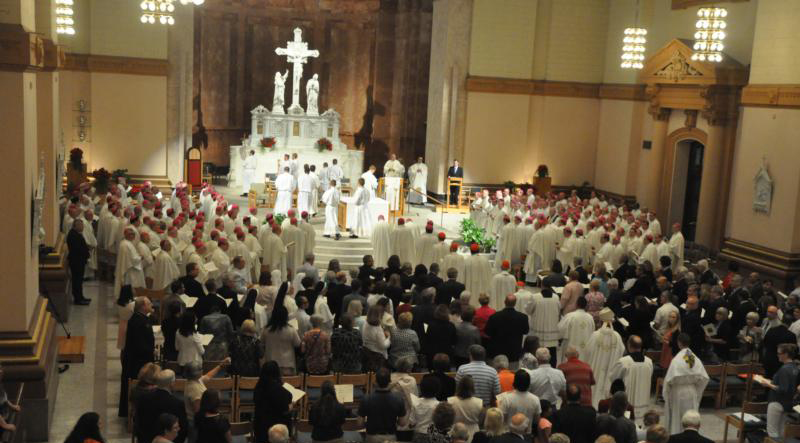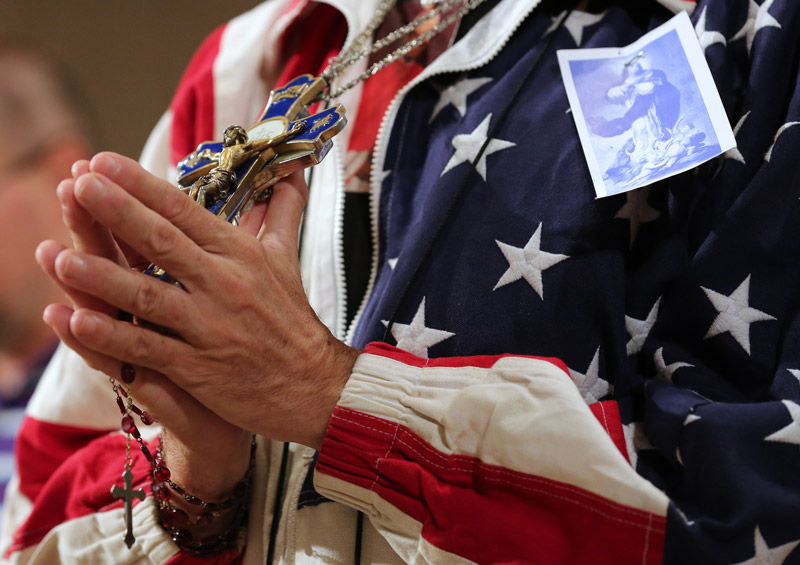
INDIANAPOLIS—The U.S. bishops voted June 15 to make the Ad Hoc Committee for Religious Liberty a permanent standing committee.
The 132-53 vote came on the second day of the bishops’ spring assembly in Indianapolis. There were five abstentions. A simple majority was required for approval.
The bishops’ action came less than a week before the start of the U.S. Conference of Catholic Bishops’ fifth annual Fortnight for Freedom June 21-July 4. It is a two-week period of prayer, advocacy and education on religious freedom.
Before the vote, Baltimore Archbishop William E. Lori, chairman of the committee since its creation in 2011, spoke in favor of making it permanent, arguing the need for the body stretches beyond the specific legal and public policy issues challenging religious freedom that continue to emerge.
“Rather, the very idea of religious freedom and its roots in human nature is challenged,” he said, “along with the right of religious people and institutions to raise their voices in the public square and to perform ministries that serve the common good in accordance with their religious and moral convictions.”
Archbishop Lori also expressed his hope the ad hoc committee’s work up to now and in the future would help “plant the seeds of a movement for religious freedom, which will take years of watering and weeding in order for it to grow, to grow strong and to bear fruit.”
“In the face of these challenges, our voice is vital,” he said. “Debates about religious freedom in our country are often, sadly, polarizing. In our tumultuous political culture, Catholic laity must be equipped to participate in conversations about the future direction of our country.”
Archbishop Lori will celebrate the fortnight’s opening Mass the evening of July 21 at the Basilica of the National Shrine of the Assumption of the Blessed Virgin Mary in Baltimore. The archbishop will celebrate a special closing Mass July 4 in Orlando, Florida, during the Convocation of Catholic Leaders.
In the discussion that followed Archbishop Lori’s presentation, some bishops spoke in favor of establishing a standing committee on religious freedom. Among them was Washington Cardinal Donald W. Wuerl.
“The challenge to religious liberty is a growing one,” he said. “The dominant culture increasingly now finds that it’s not just a matter of disagreeing with religious principles and positions. But there’s a certain level of hostility becoming more and more evident. … This problem is not going to go away.”
Cardinal Timothy M. Dolan of New York, who was USCCB president when the ad hoc committee was created, also spoke in favor of making it permanent.
He noted that bishops around the world “look to us in the United States (as) real quarterbacks when it comes to the defense of religious freedom” and added that ecumenical partners deeply cherish our leadership on this issue.
“I think it’s enhanced the cause of interreligious and ecumenical dialogue, because we’re not the only ones concerned,” Cardinal Dolan said. “So, we need some permanence. We need some stability. And I think this is the way to go.”
Some bishops felt the ad hoc committee did not need to become permanent because they felt religious liberty could be addressed by existing standing committees.
Cardinal Joseph W. Tobin of Newark, New Jersey, also noted that it was “very unfortunate” that the vote on the committee was taking place a day after the bishops allowed its working group on immigration to cease to exist.
However, after the vote on the committee, Cardinal Daniel N. DiNardo, president of the U.S. Conference of Catholic Bishops, announced he would allow the working group to continue its efforts, prompting applause from the bishops.
A statement from the USCCB said that Cardinal DiNardo noted the continued urgency for comprehensive immigration reform, a humane refugee policy and a safe border.
The working group is chaired by Archbishop José H. Gomez of Los Angeles. Their activities include statements responding to executive orders on interior enforcement, sanctuary cities, and refugee resettlement; and on legislation including the BRIDGE Act, which would provide temporary relief from deportation to youth previously protected through the Deferred Action for Childhood Arrivals (DACA) program.
The group also facilitates diocesan resources such as policy reports, prayers, educational materials, action alerts and pastoral accompaniment, and has held frequent communications among the members to discuss concerns and priorities. They also share episcopal guidance with outside partners such as Catholic Relief Services; Catholic Legal Immigration Network, Inc.; Center for Migration Studies; and Catholic Charities USA.
Another issue addressed by the U.S. Conference of Catholic Bishops on June 15 during their annual spring assembly centered on the U.S. Senate’s plan to repeal and replace the Affordable Care Act, noting that their efforts are focused on “ensuring the fundamental right of medical care” for all people.
The USCCB reinforced its stand that the American Health Care Act passed by the U.S. House on May 4 needs major reform — to provide quality health care for the voiceless, especially children, the elderly, the poor, immigrants and the seriously ill.
“We find ourselves in a time marked by a deep sense of urgency and gravity,” said Bishop George L. Thomas of Helena, Montana, in his remarks to his fellow bishops. “Within two weeks, we may see a federal budgetary action with potentially catastrophic effects on the lives of our people, most especially children and the elderly, the seriously ill, the immigrant and our nation’s working poor.”
Referring to the House bill, known as AHCA, and its plan to “eliminate $880 billion from Medicaid over the next decade,” Bishop Thomas continued, “If left unchallenged or unmodified, this budget will destabilize our own Catholic health care apostolates, take food from the mouths of school-aged children and the homebound, and deny already scarce medical resources to the nation’s neediest in every state across the land.”
He was the first bishop to speak following a report on health care reform by Bishop Frank J. Dewane of Venice, Florida, chairman of the USCCB’s Committee on Domestic Justice and Human Development.
Bishop Dewane told his fellow bishops that the USCCB has been in constant contact with members of Congress since the House passed its version of a health care plan. Noting that the USCCB sent a letter to U.S. senators June 1, Bishop Dewane said, “It called on the Senate to strip away harmful promises of the AHCA or start anew with a better bill.”
The letter also provided recommendations and guiding principles for the senators as they craft their health care plan, starting with respect for life.
“No health care reform plan should compel us or others to pay for the destruction of human life, whether through government funding or mandatory coverage of abortion,” Bishop Dewane said about that priority in his remarks.
By Sean Gallagher / Catholic News Service. Gallagher is a reporter at The Criterion, newspaper of the Archdiocese of Indianapolis.
John Shaughnessy / Catholic News Service also contributed to this report. Shaughnessy is assistant editor, newspaper of the Archdiocese of Indianapolis.



